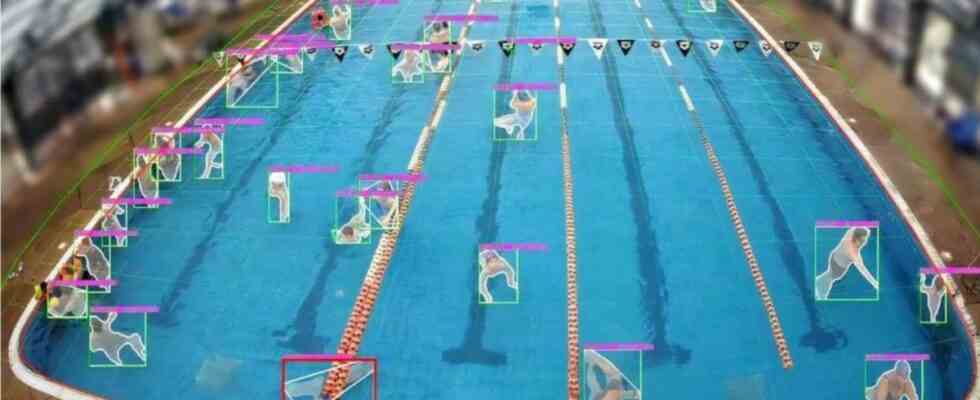In emergencies in the swimming pool, the lifeguards must react quickly. In the Südbad in Munich, the employees are now supported by artificial intelligence (AI). Eight cameras are aimed at three of the pools in Sendling, movements are recorded and analyzed. In unusual situations, the AI alerts the lifeguard with an alarm on a smartwatch. The watch will vibrate and then beep several times, a warning will appear on the display, and the watch will add a red dot to indicate where a swimmer may be in trouble.
“The digital help gives the colleagues at the pool more security,” explains employee Max Fuchs. At the end of July, the Stadtwerke München (SWM) started the “Smart Swimming Pool” pilot project in the Südbad, the test operation should initially last two years. The system comes from the company Lynxight from Tel Aviv. The cameras not only record the movements of the swimmers, but also count the people in the water.
The system is not yet error-free, the AI is in a learning phase. It should last around 60 days. So far, the system has not been able to differentiate between people who, for example, are sunbathing in the water and are intentionally not moving, or swimmers who need help. False warnings are the result. In such cases, the swimming champions can give feedback via their watches, allowing the AI to learn from their mistakes.
What is the situation in the sports pool? The AI informs the lifeguard via smartwatch.
(Photo: Catherine Hess)
Fuchs reports that supervisors in the south pool are enthusiastic. The system is particularly helpful on busy days. The support does not change the concentration of the lifeguards, the AI cannot replace lifeguards. “In the worst case, we have to save the swimmers from the water. Technology can’t do that,” says Fuchs.
So far, visitors have hardly noticed the cameras in the Südbad. Fuchs reports that no one has yet expressed any data protection concerns. As he says, these would be unfounded anyway. The cameras convert the images into data in real time, no recordings of the swimmers would be saved. The data will be deleted immediately after the analysis. Nevertheless, posters throughout the bathroom refer to the project.
The system has been used in other swimming pools in Germany for some time. In the Kleinfeldchen outdoor and indoor swimming pool in Wiesbaden, operations manager Thomas Baum describes the system as a “third eye” and values it as “valuable support at the edge of the pool”. In Munich’s Südbad, Max Fuchs is convinced that the AI will continue to be used beyond the pilot project, sooner or later it will be the future. Fortunately, there has not been a real emergency since the start of the test operation.

